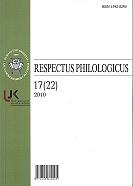JACqUES’O DERRIDA DEKONSTRUKCIJA: TEORINIAI POSTULATAI IR TAIKYMO GALIMYBĖS
DECONSTRUCTION OF JACQUES DERRIDA: THEORETICAL POSTULATES AND POSSIBILITIES OF PRACTICE
Author(s): Mindaugas GrigaitisSubject(s): Language and Literature Studies
Published by: Vilniaus Universiteto Leidykla
Keywords: dekonstrukcija1; metafizika2; raštas3; rašymas4; skirsmas5; pėdsakas6;
Summary/Abstract: The aim of this article is to analyze the concept of writing in Jacques Derrida’s deconstruction theory and to show how it might be used in practice of interpretation. The main attention is given to Der¬rida’s critics of metaphysics. Metaphysical concept of writing declares that writing is unnatural and perverse. According to metaphysical view, writing does not represent an entity. It is only secondary representation. Writing represents voice and the voice represents an entity. Derrida’s deconstruc¬tion is pointed to this concept. He claims that metaphysical way of thinking is logo and phono centric. It privileges the voice but ignores that the voice is arbitral system of signs as well as writing is. Derrida’s respond to metaphysics is that writing is not a representation of voice, it creates meaning itself. When analyzing the sign theory of Ferdinand de Saussure, Derrida exposes that all systems of signs are arbitral. Voice transforms sensual experi¬ence (thoughts and feelings) into combinations of phonemes. Thus it is totally arbitral and cannot be considered as more pure representation that writing is. The article is divided into four sections. The first ‘Metaphysical concept of writing’ presents the traditional understanding of writing. The second ‘Deconstructional concept of writing’ systemati¬cally reveals how Derrida deconstructs the tradi¬tional concept of writing. The third ‘Différance and sign’ explains the main concepts which are connected with writing. Différance means that representation always gets into differences and signs always create new essences. The last sec¬tion shows how decontructional postulates can be used in interpretational practice. An interpretation of Lithuanian writer Juozas Aputis’ short story “Erčia, kur gaivus vanduo” is presented. First, it presents the way the meaning is created. Then it is revealed how the created structure of the meaning becomes different. The interpretation reveals how metaphysics of the created meaning collapses and how the aim of representing turns into the game of signs.
Journal: Respectus Philologicus
- Issue Year: 2010
- Issue No: 17 (22)
- Page Range: 94-105
- Page Count: 12
- Language: Lithuanian

